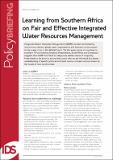| dc.contributor.author | Corbett, Hannah | |
| dc.contributor.author | Mehta, Lyla | |
| dc.contributor.author | van Koppen, Barbara | |
| dc.contributor.author | Movik, Synne | |
| dc.contributor.author | Derman, Bill | |
| dc.coverage.spatial | South Africa | en_GB |
| dc.date.accessioned | 2014-10-23T10:20:37Z | |
| dc.date.available | 2014-10-23T10:20:37Z | |
| dc.date.issued | 2014-10-14 | |
| dc.identifier.issn | 1479 974X | |
| dc.identifier.uri | https://opendocs.ids.ac.uk/opendocs/handle/20.500.12413/4863 | |
| dc.description.abstract | Integrated Water Resources Management (IWRM) has been promoted by international donors, global water organisations and financers as the answer to the water crisis in the Global South. Yet the experiences of countries in southern Africa including Tanzania, Mozambique, South Africa and Zimbabwe suggests that IWRM has failed to adequately address issues of inequality. More needs to be done to ensure that water reforms are informed by a better understanding of specific political and social country contexts and are driven by the needs of local communities. | en_GB |
| dc.language.iso | en | en_GB |
| dc.publisher | Institute of Development Studies | en_GB |
| dc.relation.ispartofseries | IDS Policy Briefing;77 | |
| dc.rights | Readers are encouraged to quote and reproduce material from the IDS Policy Briefing series. In return, IDS requests due acknowledgment and quotes to be referenced as above. | en_GB |
| dc.rights.uri | http://www.ids.ac.uk/files/dmfile/IDSOpenDocsStandardTermsOfUse.pdf | en_GB |
| dc.subject | Water | en_GB |
| dc.title | Learning from Southern Africa on Fair and Effective Integrated Water Resources Management | en_GB |
| dc.type | IDS Policy Briefing | en_GB |
| dc.rights.holder | Institute of Development Studies | en_GB |
| dc.identifier.team | Knowledge Technology and Society | en_GB |

